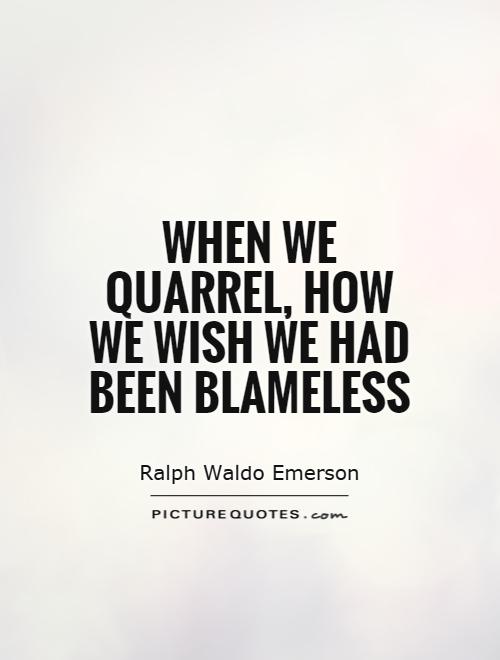When we quarrel, how we wish we had been blameless

When we quarrel, how we wish we had been blameless
Ralph Waldo Emerson, a renowned American essayist, poet, and philosopher, often explored themes of self-reliance, individualism, and the importance of personal growth and self-improvement. In his essay "Self-Reliance," Emerson emphasizes the importance of taking responsibility for one's actions and decisions, and the value of striving to be blameless in all aspects of life.Emerson believed that quarrels and conflicts often arise from misunderstandings, miscommunications, and the inability to see things from another person's perspective. He argued that when we find ourselves in the midst of a quarrel, we often wish we had been blameless in order to avoid the pain and suffering that comes with discord and strife. Emerson believed that by striving to be blameless in our actions and interactions with others, we can avoid unnecessary conflicts and maintain harmonious relationships.
Emerson's philosophy of self-reliance and personal growth can be applied to the way we handle quarrels and conflicts in our own lives. By taking responsibility for our actions and striving to be blameless in our interactions with others, we can avoid unnecessary conflicts and maintain healthy relationships. Emerson believed that by cultivating a sense of self-awareness and self-improvement, we can become better equipped to handle conflicts and disagreements in a constructive and positive manner.
In the context of Emerson's teachings, the idea of wishing to be blameless when we quarrel takes on a deeper meaning. It is not just about avoiding conflict or seeking to be right, but about taking responsibility for our actions and striving to be the best version of ourselves. By embodying the principles of self-reliance, personal growth, and self-improvement, we can navigate conflicts with grace and integrity, and work towards building stronger, more meaningful relationships with others.












 Friendship Quotes
Friendship Quotes Love Quotes
Love Quotes Life Quotes
Life Quotes Funny Quotes
Funny Quotes Motivational Quotes
Motivational Quotes Inspirational Quotes
Inspirational Quotes